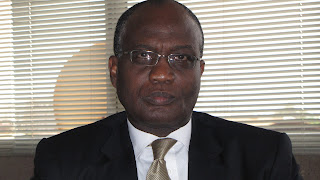 |
| One of the injured at the hospital |
SEVEN workers of Special Steel Limited, a steel manufacturing company in Tema, sustained serious injuries during an explosion at the melting plant of the company on Tuesday night.
Of those who were injured in the accident, which occurred at 11:05 p.m., Francis Annor, a welder, and an expatriate supervisor whose identity was not immediately known, are said to be in critical condition.
The expatriate supervisor has been referred to the Tema General Hospital because of the severity of his condition.
The injured are Robert Ankrah, Eric Azilaku, Joseph Nartey, Kwamena Arhin and Anthony Ansah. They are receiving attention at the Raphal Medical Centre in Tema.
The latest incident is the third in a series to have rocked the company this year, after similar explosions on January 27 and 29, 2012 left four people injured.
When the Daily Graphic visited the hospital, paramedics were attending to the victims, some of whom had suffered severe injuries on their faces, hands and bottoms.
One of the injured, Kwamena Arhin, told the Daily Graphic that the accident occurred shortly after a crane operator had dumped a quantity of heavy ferrous scrap metals into the furnace for melting.
“Moments after the crane operator had deposited the scrap metals, we heard a blast, which came with an accompanying flame,” he said, adding, “The entire furnace floor was completely taken over by the blaze, trapping us in, while we made great effort to locate the stairway to enable us to escape.”
The fire, he said, spread quickly to other portions of the structure housing the furnace, prompting him and his colleagues to scale over the wall of the structure because poor visibility made it difficult to locate the doorway.
When the Daily Graphic visited the factory at 8 a.m. yesterday, production activities were in earnest at the furnace, with no visible sign of an accident the previous night.
Company officials who initially downplayed the seriousness of the incident, however, told the Deputy Minister of Employment and Social Welfare, Mr Antwi Boasiako-Sekyere, that the victims suffered from injuries resulting from a splash of molten iron and flame on them.
The Deputy Managing Director of Special Steel, Mr Rajan Vinod Kumar, told the deputy minister, who was accompanied by the acting Chief Inspector of Factories, Mr Adjei Boye, and other officials, that the accident was unfortunate.
Commenting on the incident, the General Secretary of the Ghana Federation of Labour (GFL), Mr Abraham Koomson, called on the authorities to temporarily close down the factory to allow for a proper safety audit by the ministry.
According to him, the increasing nature of such incidents in various factories in the Tema metropolis was a clear indication that managers of those institutions were just profit centred, neglecting the safety and occupational conditions of their workers.
Mr Boasiako-Sekyere, who expressed regret over the latest incident, tasked company officials to improve safety standards in the factory to ensure occupational safety.
The deputy minister, who later visited the victims at the hospital, announced that the ministry had tasked the Labour Department to give an ultimatum to all employment agencies that were operating illegally to register and update their records with the department.
He expressed disappointment at the company officials’ decision to resume operations at the furnace 15 minutes after the incident and cautioned that the ministry would not hesitate to sanction the company if found to have neglected its responsibility, resulting in the incident.
Mr Boasiako-Sekyere tasked the Tema Metropolitan Department of Factories Inspectorate to investigate the incident and present its finding to the ministry within two weeks for appropriate action.









